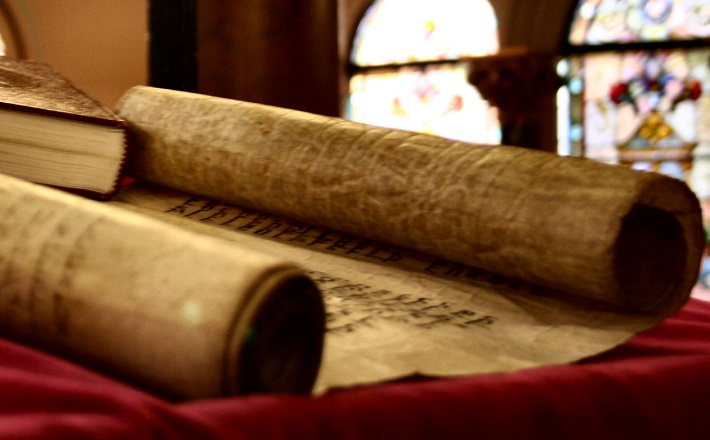Commentary on Psalm 19
We have a gift in Psalm 19. Bach, Beethoven, Handel, and Haydn expressed their delight with this Psalm through now well-known musical settings of its text.
Judaism recites the words of this Psalm at Shabbat and Yom Tov. In his Reflections on the Psalms, C.S. Lewis declared Psalm 19 the treasure trove of the Psalter: “I take this to be the greatest poem in the Psalter and one of the greatest lyrics in the world.”1
Overview of the Psalm
Psalm 19 contains a series of subtle, contrasting, both-and-statements, or dyads. The heavens day after day and night after night (v. 1), yet they do not use words (v.3). YHWH is the cosmic ruler of the glorious heavens (vv. 1, 4), yet relational enough to give individuals precepts for righteous living (vv. 7-14). The heat of the sun covers the whole earth, yet gives life rather than destruction (v. 4-6). The Psalmist is identified as a leader, yet possesses a humble servant’s spirit (vv. 13-14).
The Psalm is comprised of three distinct sections: verses 1-6, verses 7-11, and verses 12-14. Verses 1-6 illustrate YHWH’s sovereignty over the whole creation. Just as the sun stretches over the entire heavens to illuminate the ends of the earth, so does YHWH the Creator rule over the entire world. Verses 7-11 uphold that it is the responsibility of the One who rules to provide wise instruction to humanity. This instruction, however, may be more about the responsibility humanity has to align itself with the ways of God than the revelation God is required to give to humanity. The final three verses of the Psalm (vv. 12-14) confirm there is great reward for those who connect themselves to the greater cosmic reality that is YHWH.
A Psalm of Instruction
While it can be difficult for preachers to resist finding a single, unifying thread that ties this Psalm together, this thread may not be necessary or important. In most instances, reducing Psalm 19 to a single theme will most likely lead to “skewed interpretations” of the entire Psalm. Often, preachers are apt to focus only on themes of natural and special revelation at the expense of other possibilities.2
If this Psalm is to be reduced to any theme, it is an attentiveness to the sovereign YHWH’s instruction. In this respect, Psalm 19 pulls together themes from the opening and closing of the Psalter: Psalm 1 with its emphasis on YHWH’s teaching and Psalm 148 with its emphasis on YHWH’s sovereignty. These two themes are woven throughout the book of Psalms, but they are rarely juxtaposed so closely as we find them in Psalm 19.
While juxtaposing these two themes inevitably alludes to the plausibility that Psalm 19 may have originally been two separate Psalms, this must be held in tension with unifying features found in the full Psalm. For instance, “speech” (vv. 2-3) and “words” (v. 14) appear at the beginning and end of the Psalm, and “perfect” (v. 7) and “blameless” (v. 13) link vv. 11-14 with vv. 7-10. Because of these and other reasons, J. Clinton McCann, Jr. suggests Psalm 19 primarily be read as a single unit intended to teach. Psalm 19’s “instructional intent,” McCann claims, is “emphasized by its placement within a series of Royal Psalms (Psalm 18, 20, 21).” In such a reading, Psalm 19 “describes the orientation to life that faithful kings were supposed to embody and model for the people.”3
Learning from Psalm 19
What might we learn if we examine this Psalm from the pulpit? By examining the three distinct sections and contrasting themes of Psalm 19, we might learn the lesson that we, like most people today, live a life that contradicts the Psalm. We love the beauty of a sunset and the majesty of nature, yet we find the Word of the Lord to be oppressive. However, the wisdom of Psalm 19 declares that the transcendent quality of nature, indeed YHWH’s sovereignty over nature (and the whole creation) to be downright frightening. Yet, the Holy Scriptures are full of grace and promises of new life, not bondage to a higher power that is removed and inaccessible.
By focusing on one theme from Psalm 19, such as that of instruction, we might learn the whole story behind YHWH’s teaching. We might learn once again the lesson that the sovereign YHWH gave us instructions so that we may reclaim the primary purpose of creation which the Gospel now proclaims: love bound in relationship between Creator and created, now made manifest in the life, death, and resurrection of Jesus Christ.
Realigning our lives and reclaiming creational purpose are two important lessons of this Psalm, but surely there are more, especially when read through the lens of this week’s Lectionary passages. Whatever this Psalm teaches us this Epiphany week, may our lips join Gregory of Nazianzus (Cappadocia, modern-day Turkey, BCE 325-390) to pray:
Thy grace, O Father, give,
That I may serve in fear;
Above all boons, I pray,
Grant me Thy voice to hear;
From sin Thy child in mercy free,
And let me dwell in light with Thee.
Notes:
1 C.S. Lewis, Reflections on the Psalms (New York, NY: Harcourt, Brace, and Company, 1986), 63.
2 John Goldingay, “Psalm 19,” in Psalms, Volume 1: 1-41, ed. Tremper Longman, III, Baker 297-298.
3 J. Clinton McCann, Jr., “The Book of Psalms,” in The New Interpreter’s Bible (Nashville, TN: Abingdon Press, 1996), 4:751.


January 24, 2016